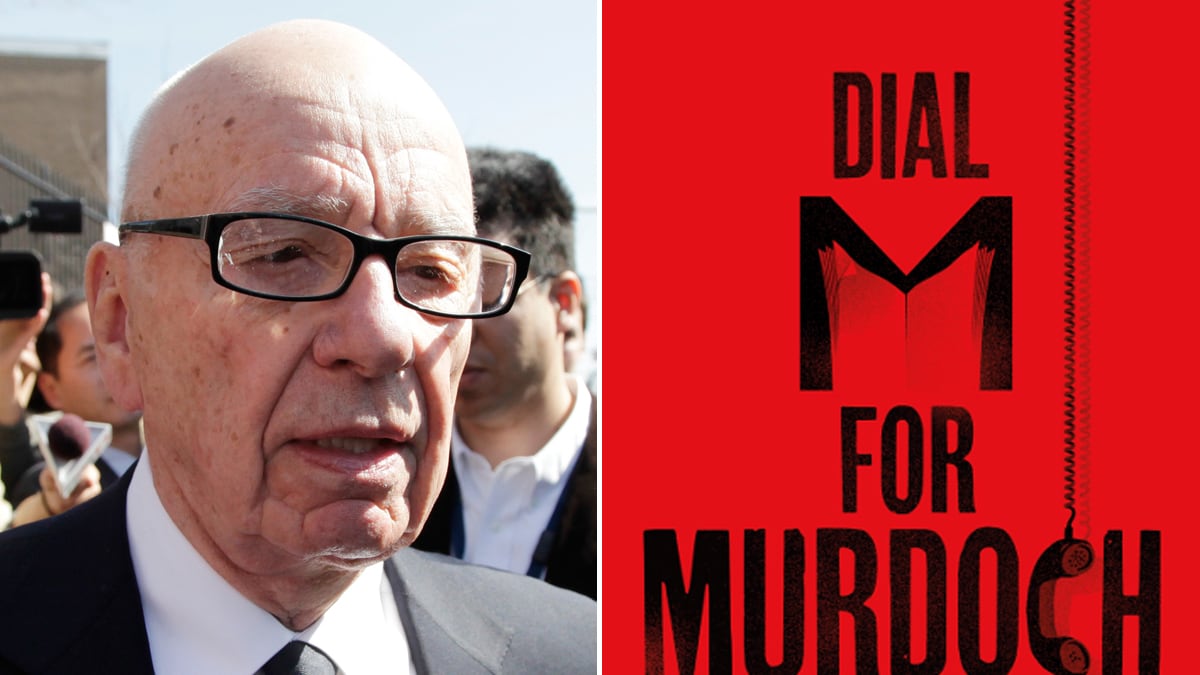There are prizes for arriving first. Not only was the Labor M.P. Tom Watson one of the first politicians to investigate rumors of a massive cover-up of phone hacking at Rupert Murdoch’s U.K. subsidiary News International, he has also–with his friend Martin Hickman of the Independent–written Dial M for Murdoch, the first full account of the scandal that broke last summer.
The book’s polemical claim is that News International, News Corp.’s U.K. subsidiary, which owns 40 percent of the country’s newspapers and a controlling stake in its biggest broadcaster by revenues, BSkyB, became so embedded in British politics and power structures that it operated at as a “shadow state.” But Watson and Hinkman, rather than argue such a case, instead illustrate it in a brisk and compelling narrative covering the last 10 years.
With the Hitchcockian reference in its title, Dial M for Murdoch does indeed read at times like a thriller--a gripping and indispensable first account of the phone- hacking scandal that shut down the world’s biggest-selling tabloid, News of the World, and the allegations of computer hacking, police bribery, and corporate cover-up that continue to hound News Corp., the world’s third-largest media conglomerate.
As you might expect from a politician and a journalist, the most revelatory parts of Dial M for Murdoch cover the dark arts of Fleet Street and the way this overlapped with the politics at Westminster. Watson himself was a victim of tabloid “monstering” before he even led the parliamentary charge into investigating what News International had really been up to in its Wapping headquarters. His trajectory through the last six or seven years reads something like a cross between The Insider and All the President’s Men: public disgrace and tabloid libels followed by threats, intimidation, surveillance, and the sense of a murky, powerful organization, just out of sight and beyond accountability.

Hickman and Watson also provide the first coherent story of the civil legal cases for phone-hacking victims which eventually began to eke out the truth through legal disclosure. While the police were supine and Parliament stalled, some Manchester lawyers continued to pursue their clients’ claims. In the case of lawyer Mark Lewis, this meant having his family being followed by private detectives while he was being threatened with legal disbarment.
The book then switches track to the slow journalistic investigation, led by the Guardian’s Nick Davies (who is also soon to publish his account as a book), which began to chip away at News International’s “rogue lawyer defense.” Early on Davies was told that there were actually “thousands of victims” in the files the police held as evidence, but in one of the most disturbing sections of the book, Davies’ work was rubbished by the Press Council, the police, and other papers, and effectively ignored by Parliament, despite the help of the New York Times, until he finally revealed the murdered schoolgirl Milly Dowler was also a victim of hacking by News of the World on July 4 last year.
The torrent of revelations that followed over those few weeks last summer is the natural culmination of Dial M for Murder, with an extraordinary feeling of vindication for Watson himself, and liberation for many politicians and journalists who lived in fear of News International, and Murdoch’s willing lieutenants here, such as Rebekah Brooks and Andy Coulson. As both of them were arrested and Rupert and James Murdoch are summoned to appear before Parliament (by a sargeant at arms turning up at their Wapping HQ), the narrative of time reads like a virtual revolution for a whole political and media class who had formerly lived in fear.
Despite his fearlessness, Tom Watson was one of those targeted after he had the temerity to sign a letter calling on Tony Blair to stand down in favor of Gordon Brown after the 2005 general election. What followed was a concerted campaign led by Rebekah Brooks to discredit and smear him before seven million readers, and columnists describing him as “Treacherous Tom Watson–a tub of lard who is known without affection at Westminster as ‘Two Dinners’ Tommy–is suspected of being up in this to his bloated and bulging neck.”
If one wanted a more accessible and visceral account of the effect of overweening media power on individuals during the heyday of News International, then Watson’s personal struggles against the Murdoch press would make a book of their own. More than once, their campaign of character assassination and intimidation brought Watson to the verge of emotional breakdown. In press interviews since the launch of his book, he claimed the pressures broke up his marriage. For obvious reasons—Watson is on the parliamentary committee still reporting on the Murdochs—that personal account is only hinted at here, but it’s an omission a second edition should not lose sight of.
The other big omission is, of course, the unfolding saga—and in this being first can be a handicap, for the story is far from over. There have been dozens of additional arrests since last summer, and the plot has moved on to allegations of bribery of the police by the Sun daily tabloid, as well as police investigations of computer hacking and alleged corporate cover-up. None of the 40-plus arrested so far have been charged, and trials may well stretch until 2014. The Leveson Inquiry won’t conclude and report until next year. Dial M for Murder may be the first full-length book on the hacking scandal, but it certainly won’t be the last.






